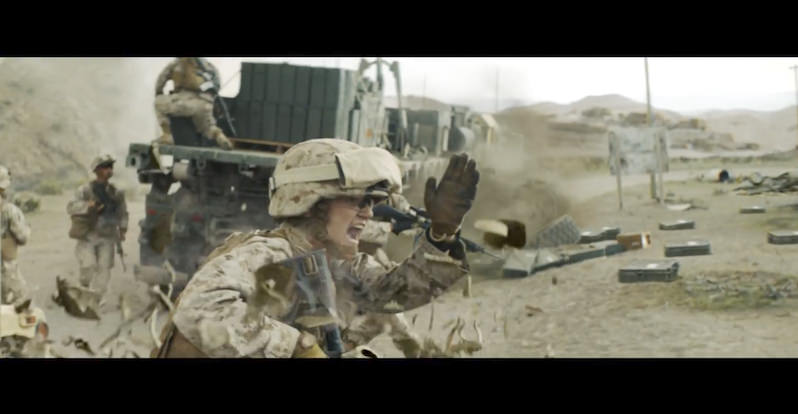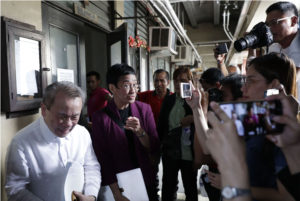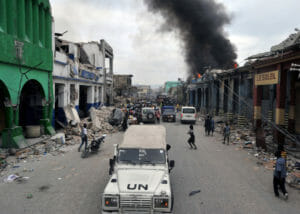Marines’ ‘Always Faithful’ Motto Doesn’t Apply to Fellow Females
Online nude-photo scandal underscores a pigheaded cluelessness about women in the ranks. Marine Capt. Erin Demchko is shown in this still image from a recent TV advertisement released by the U.S. Marines as part of an effort to recruit women.
(U.S. Marine Corps via AP)
Marine Capt. Erin Demchko is shown in this still image from a recent TV advertisement released by the U.S. Marines as part of an effort to recruit women.
(U.S. Marine Corps via AP)
Marine Capt. Erin Demchko is shown in this still image from a recent TV advertisement released by the U.S. Marines as part of an effort to recruit women. (U.S. Marine Corps via AP)
“Unlike other habits that the military efficiently drills out of its members, there’s no effort to do the same when it comes to sexist behavior.”
—Marine veteran Dr. Kate Hendricks Thomas and Army reservist Paula Broadwell
The first women were assigned to a Marine infantry unit on Jan. 5, fulfilling the 2015 Department of Defense mandate that all military service jobs, including combat, be open to women.
By late January, a Google Drive link with photos of nude and barely dressed Marine servicewomen was posted to the Marines United Facebook page without the knowledge of the women involved. Postings also divulged their names, ranks and military duties.
Marines United, a male-only site for current and former Marines, U.S. Navy corpsmen and British Royal Marines, has a following of some 30,000 members whose bases span the globe. Members describe it as a site that helps vets find jobs and assists those feeling suicidal. It also carries degrading commentary about women. The news of nonconsensual nude photos with woman-hating commentary erupted into national media in March.
By then, 2,500 comments, some threatening rape and other sadistic sexual torture—couched in weaponized humor—had been posted to the site.
The Marines United rules of conduct—no racist or illegal posts, no threats, harm or harassment—and the Marines’ hallowed motto semper fi (“always faithful”) apparently do not apply to its treatment of women. Why? Because from basic training onward, women are stereotyped as “bitches,” “sluts” or “lesbians,” as one 23-year-old Marine veteran testified at a recent congressional hearing.
The Marines United story exploded like a roadside bomb run over by a convoy truck. Journalist and Marine veteran Thomas Brennan, who broke the story, and other veterans have since tracked the electronic dodges, feints and shifting Facebook sites of Marines United more nimbly than military officials have. Top Marine brass, under heavy fire from female legislators for other pornographic Facebook sites, confessed four years ago that they lacked “manpower” and “technological resources” to counter electronic sexual assault on their female members.
Baffling, isn’t it, that a military with the best cyberwar capabilities in the world and a defense budget larger than the next eight countries combined can’t control a cyberattack on women within its own ranks?
What is different about this latest saga of sexual assault in the military relates to who tracked, broke and followed the Marines United story. A handful of Marine veterans (notably, Brennan, James LaPorta and Shawn Wylde)—at some risk to themselves and their families—pursued the roving Marines United site, including its hydra-headed permutations, more frontally than the military did.
LaPorta, now a journalist for The Daily Beast, informed me that he began covering the Marines United story when he was asked by Brennan “to screenshot any death threats [against Brennan] that I saw inside the secret Facebook chatroom known as Marines United and send them to him. He also asked that I pick up the reporting, so I did, and that’s what I have been doing since March 4, 2017.”
LaPorta recently testified at a congressional hearing hosted by the Democratic Women’s Working Group that he has found “multiple examples of extortion, revenge porn, nonconsensual photo sharing, death threats and online harassment that target not only the women, but their friends and family members.”
Whence comes your courage? I asked. His response: “I don’t know if reporting on the nude-photo scandal within the Pentagon was courageous, but I do know it was the right thing to do.”
What has not changed is the justifiable rage and legislative activism of women on the Senate and House Armed Services Committees, among them California Rep. Jackie Speier and New York Sen. Kirsten Gillibrand, veteran critics of the unchecked epidemic of sexual assault in the military and its academies. What has not changed is the military’s failing performance—it has been missing in action for years when faced with the online sexual aggression of “brothers in arms” against their “sisters in arms.” What has not changed is the ruinous impact of this latest form of assault on female soldiers.
Military Response
A little bit of background sheds light on this latest failure of support for military women.
In his 2012 State of the Union address, President Obama opened and closed with iconic praise for the military. Yet his script, which hailed military cohesion and loyalty as models for Congress and the country, omitted any mention of female soldiers, even though women constitute 15 percent of all active duty military, and rampant military sexual assault was still fresh news in Washington.
Just six days earlier, Secretary of Defense Leon Panetta held a press conference to announce new reforms being launched by the Department of Defense to combat sexual assault. This public airing of the military’s heart of darkness—sexual crime in its ranks—came on the heels of an estimated 19,000 military sexual assaults in the previous year, by DOD calculations (a gross undercount because of substantial underreporting due to fear of retribution).
Panetta cited the “moral duty” of the military to keep its members safe and called sexual assault an affront to American values. Like so many institutional leaders undergoing public scrutiny for sexual abuse that took place on their watch, he took the high road: “One sexual assault is one too many,” he said. The avuncular leader of the most powerful and lethal military in history appeared stricken and, frankly, helpless, in admitting to rampant military sexual crime and sadism. By contrast, his arrogant predecessors—Donald Rumsfeld and Robert Gates—resembled stone-faced, callous archbishops and cardinals confronted with sexual abuse by clergymen under their watch. Eight years prior, then-Secretary of Defense Rumsfeld had also declared that “[s]exual assault will not be tolerated in the Department of Defense” and had ordered a 90-day review of sexual assault policies. Experts and victims alike assessed “the analysis of the issues [as] shallow, and the plans for addressing them limited.”
Fast-forward to March 2017. In a Senate Armed Services Committee hearing on Marines United, Sen. Gillibrand seared the Marines’ highest ranking officer, Gen. Robert Neller, following his remarks to the committee. As top commander, he took personal responsibility for this most recent sex abuse scandal, asking female Marines to trust him to ensure that they gain the respect they deserve as Marines, and pleading with male Marines to see servicewomen as their equals. Nice words, but his testimony “rings hollow,” shot back an enraged Gillibrand. She added that nothing has been done in the years since misogynistic Marine social media sites were discovered and victims came forward and asked, if the Marines “can’t crack Facebook, how are we supposed to be able to crack Russian aggression and cyberhacking throughout our military?” Neller’s face morphed from grave and authoritative to humiliated and hangdog.
In my correspondence with the Marine Corps communications office, I sought its perspective on misogyny in its ranks, the gravity of the degrading online sex sites and its plans to reform the institution. In its responses, key dodges emerged. The corps relies on moral military messages and fundamentalist exhortations reminiscent of a catechism: “We do not abandon our core values when we enter the online world” was one, and another: “Marines, by and large, possess and act in accordance with our core values of honor, courage and commitment.” It also resorted reflexively to mandatory education in new policy, this time regarding “degrading social media posts”—but the education is never evaluated afterward for attitudinal and behavioral change.
Since the Marines United scandal, the office told me, the task force created to frame the problem and to generate and implement near-term actions is composed of 40 percent women, military and civilians drawn from multiple disciplines—a good start. More pertinent is the plea of Sgt. Maj. Ronald Green, the highest-raking noncommissioned officer of the Marines to “act” and “come forward and report” misogynist online conduct. But the toughest stuff—drilling sexist behavior out of recruits and punishing more than a few token offenders—begs for immediate, hard-hitting action.
Radical Response
Retired Col. Don Christiensen, a former Air Force chief prosecutor and sixth-generation member of a military family, heads Protect Our Defenders, a national organization dedicated to ending rape and sexual assault in the military and to combating a culture of pervasive sexual harassment and retribution against victims.
I asked what motivated him to work in retirement on behalf of female victims of military sexual assault. “It was after witnessing too many times an offender’s commander and unit rally around him at trial,” he told me. “It was the ease with which too many would blame the victim, shun her at work, and character-assassinate her at trial. Too often, I saw victims run a figurative gauntlet of abuse and retaliation from the command structure she thought was there to protect her.”
Women face even more misogyny and sexism in “the very closed society” of the military, he said, with the “continual message [that] women aren’t worthy of respect,” a message conveyed by “public and private resistance to integration, lower rates of promotion and fewer opportunities to lead.” This former top military litigator directs his most scathing critique at leaders who “view women as little more than entertainment for generals and admirals.”
Repeatedly, he said, senior officers who have improper relationships with much junior female military members “receive little or no punishment, and they are never prosecuted.” The message to the rest of the military is, “A woman’s value is as a sexual object, not as an equal in taking the fight to the enemy.”
To the question of what would change the permissive culture of sexual degradation in the military and impunity for those who perpetrate it, Christiensen offered two structural recommendations: One is “accountability at all levels. For some, that accountability should be by court-martial. For others, it should be to quickly terminate their service.” Christiensen added that the Marine Corps “was on notice for at least four years that this cancer [referring to misogynist social media sites] was in the corps. Yet leadership did nothing.”
Employing an analogy that many men would appreciate, he concluded, “If a football team continues to have an discipline problem, you don’t address that by firing the equipment manager. You fire the coach. It’s time that the Marine Corps and really all of the DOD accepted that reality.”
The second course of action he prescribed is to take all aspects of prosecution out of the hands of commanders by creating “an independent military prosecution office” that enlists experienced sexual assault and rape prosecutors. “Even the best commanders are out of their league when it comes to making prosecution decisions for felony crimes,” Christiensen said. Independent prosecution will excise a commander’s capacity to protect an abuser and his unit’s reputation. And it will “send a strong message to survivors that they have someone in their corner outside the chain-of-command politics,” he said.The Response of Female Veterans
Lance Cpl. Marisa Moytek, an Iraq War veteran and daughter of a Marine veteran, was barraged with sexual harassment and threats of abuse after her photos and ID were uploaded without her knowledge to Marines United. She had once loved the familylike bonds in the military, but that changed after her ordeal. “Even if I could, I’m never re-enlisting,” she said bitterly. “Being sexually harassed online ruined the Marine Corps for me, and the experience.”
Dr. Kate Hendricks Thomas, an active-duty Marine from 2002-8, was not surprised by the news of Marines United, remarking that sexual abuse pervades the military, and noting that its victims are advised not to pursue a formal complaint lest it make the unit look bad. She always carried a gun and a knife when going to the shower trailers on her bases, due to constant fear of sexual assault. She also packed a can of black spray paint to obscure the ubiquitous pornographic cartoons in bathrooms that might trigger sexual fantasy narratives among her fellow Marines about raping her.
Would she recommend the military to young women as a work or career option, despite her siegelike life there? “Yes,” she replied to my query. “Women have always broken barriers and entered unfriendly spaces with eyes open, determined to make change. … Misogyny and cyber-harassment happen in civilian spaces, middle schools, and civic groups, too.”
Thomas survived; others in a similar situation did not. Female soldiers at Camp Victory in Iraq died from dehydration in their sleep because, despite the 120-degree desert heat and little to no air conditioning, they stopped drinking liquids after 3 or 4 p.m. in order to avoid using remote, unlit latrines due to the high risk of sexual assault by fellow soldiers.
Their senior Army commander in Iraq, Lt. Gen. Ricardo Sanchez, ordered a cover-up of this potentially explosive news, directing the reporting surgeon to omit in oral briefs that the deceased soldiers were women and to leave out the real cause of death on their death certificates. His stance? “The women asked to be here, so now let them take what comes with the territory.”
The Impact of Sexual Aggression on Women in Military
I asked Thomas whether sites such as Marines United are qualitatively different from other forms of misogyny women may encounter in the military, such as sexist language, threats and assault. She responded: “The current harassment happening online is the same behavior via different medium. It falls along a continuum of harm.”
That continuum can and does reach the extreme for military women. Studies reveal that military sexual assault is more traumatizing than combat, that it is more damaging than the traumas of being ambushed, shot at, caught in crossfire, of rescuing mangled and dying comrades and the dread of driving over a roadside bomb. One striking Department of Veterans Affairs study of more than 300 female veterans enrolled in a clinical program for stress disorders found that “stress related to sexual harassment and sexual abuse “was almost four times more influential than duty-related stress in the development of [post-traumatic stress disorder].” Military sexual stress creates a toxic, private war zone that takes more psychic strength to endure than combat requires.
The Response of Female Legislators
For six years Rep. Jackie Speier has fought to wring justice, respect and loyalty out of the Department of Defense for its enlisted women, who serve within a system that is rank with the “culture rot” of sexual harassment, sexual abuse and online misogyny. Along with other supportive legislators, her efforts have resulted in better services for survivors of military sexual abuse and movement toward having special prosecutors handle sex abuse cases.
To the question of whether misogyny is worse in the military than civil society, she conceded, “[I]t is in part because of the ‘family unit’ where they have responsibility to have each other’s back.” A woman victimized or threatened by sexual abuse knows that if she reports this, “no one will have her back.”
The military command, Speier adds, “doesn’t get it.” Gen. James Amos, the previous Marine commandant at the time when earlier misogynist sites like F’N’ Wook (“wook” being a woman who sleeps her way up with officers) were online, framed it as a “few bad apples” and an “IT problem.” The current commandant, Gen. Robert Heller, sees it as a “culture” problem. But what he calls a “stain” on Marine culture, Speier calls “culture rot.”
For Speier, as a member of the House Armed Services Committee, online military woman-hating pornography is different from the decades-long epidemic of military rape and sexual harassment. The commanders and Armed Services Committee legislators “can see the photos; and the degradation is tangible,” she said. Photos depicting rape and death threats are “objective compared to the personal testimonies of women,” she added, which the military doesn’t “want to hear.”
But the House Democratic Women’s Working Group does want to hear, and it is “going to be like a dog with a bone—they won’t let it go.” A legislative activist, Speier has introduced measures designed to criminalize any service member who shares intimate photos of another service member without their consent, closing a massive gap within the Uniform Code of Military Justice.
While the military command takes the position that sharing nude photos on the internet without the consent of the victim could result in administrative or criminal procedures, the lionhearted Speier posits that the action should result in criminal charges.Conclusion
After studying atrocities committed by U.S. soldiers in Vietnam, social psychiatrist Robert Jay Lifton posited that a war with no moral core increases the likelihood that soldiers will commit atrocities, including sexual atrocities. Yet, while 15 percent of armed forces are now female, it is men, not women, fighting our arguably ineffective and immoral wars who sexually traumatize their fellow soldiers.
Why do so many male soldiers sexually humiliate, intimidate and assault their fellow female soldiers? The answer may lie with the convergence of a military culture that glorifies violence toward “the other” and is saturated with hostility toward women, from basic training to the battlefield and barracks; an early life of abuse, which turns the abused male child into an abuser in the military; and a military leadership that ignores, tolerates, encourages or participates in sexual abuse. Which is to say that soldiers rape and threaten rape online because they are socialized in physical and sexual violence, and because they can get away with it.
Recruitment is another portal to military sexual violence. It’s commonly known that military recruiters have lured adolescents with opportunities to buy sex in distant places like the Philippines, Italy and Panama. On the ground, sex, combat and male camaraderie can be a big draw for many adolescents who enlist.
Boasting about heterosexual exploits can also be the glue that binds and unifies for killing in combat. So concluded anthropologist Anna Simons after living among and studying Green Berets in combat training. Discussions of religion and politics, which carry the risk of disagreement and disunity, are avoided. On the other hand, Simons found, bragging about scoring women creates friendly competition and male bonding and provides pseudo-individuality without diminishing group identity. How could a culture based on bonding around sexual exploitation possibly create space for women as equals?
The military modus operandi since the 1990s has been a cyclic scandal of sexual abuse, study after commissioned study, de rigueur congressional hearings and unfulfilled promises of reform. The seeds of radical military reform lie far afield from these feeble reactions. The most viable include cultivating moral conscience vis-à-vis sexism in male recruits from basic training onward, creating independent criminal prosecution of sex offenders and safeguarding female victims.
Nothing will change for women in the military or civil society until men learn to welcome women as their equals and summon the moral courage to call out other men on their degrading attitudes and actions toward women. But nothing will change the sexual violence-prone culture of our military until our national habit of responding to conflict with force is subordinated to muscular, peace-seeking diplomacy.
Your support matters…Independent journalism is under threat and overshadowed by heavily funded mainstream media.
You can help level the playing field. Become a member.
Your tax-deductible contribution keeps us digging beneath the headlines to give you thought-provoking, investigative reporting and analysis that unearths what's really happening- without compromise.
Give today to support our courageous, independent journalists.






You need to be a supporter to comment.
There are currently no responses to this article.
Be the first to respond.